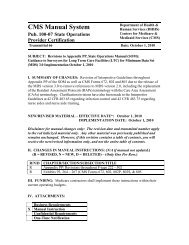LOUISIANA Community Mental Health Services Block Grant ...
LOUISIANA Community Mental Health Services Block Grant ...
LOUISIANA Community Mental Health Services Block Grant ...
Create successful ePaper yourself
Turn your PDF publications into a flip-book with our unique Google optimized e-Paper software.
The OBH service delivery system includes a comprehensive array of services organized to meet the<br />
needs of adults with serious mental illness, and children/youth with emotional/behavioral disorder<br />
and their families in each region of the state. However, each of the components of the comprehensive<br />
service system exists at a level that is far below that required to satisfactorily meet the demand in<br />
each region. This is due mainly to fiscal and workforce constraints, and is not due to a lack of<br />
awareness about needs, nor due to lacking the will to establish a maximally responsive and<br />
comprehensive system of care.<br />
Fiscal and workforce constraints have created a situation where there is demand for services beyond<br />
what the system is able to supply. For example, insufficient numbers of direct service providers to<br />
address basic treatment and support needs of the community service population continues to be<br />
problematic. A common complaint expressed in surveys of consumers is not being able to see their<br />
therapist or doctor often enough, and having to participate in group treatment rather than more<br />
individualized treatment. The lack of treatment resources inhibits the ability of the State to provide<br />
as much in the way of outreach programming as would be ideal. A lack of healthcare providers<br />
continues to be a pressing concern statewide, and is particularly critical in some areas.<br />
Additional steps are being taken to increase access to qualified prescribers in the community mental<br />
health system. OBH has developed a policy that now will permit local CMHCs to contract with or<br />
employ Medical Psychologists (MPs) and Nurse Practitioners (NPs) who can prescribe psychotropic<br />
medications. This policy is designed to ease the burden on the limited number of psychiatrists who<br />
are available in the state, particularly in the more rural areas that have found it difficult if not<br />
impossible to recruit and retain these medical specialists. There are several regions in the state that<br />
have begun to successfully utilize non-physician prescribers.<br />
The per-capita expenditure for services remains below the national average despite exceptional<br />
efforts on the part of stakeholders to provide more sufficient funding levels for mental health<br />
programs. Efforts to ease the fiscal needs of the system require a continuously adapting and flexible<br />
workforce. Although certainly not yet widespread, and in itself an area of need, the implementation<br />
of evidence-based practice provides a framework for the future and a direction for the training of<br />
healthcare providers.<br />
Early intervention and prevention programs are essential in meeting the mental health and substance<br />
abuse needs of the children/youth and their families. Generally speaking, youth in the custody of the<br />
child welfare and juvenile justice system receive mental health and substance abuse treatment in<br />
restrictive settings. The private sector provides mainly outpatient services and is not generally a rich<br />
resource for the population that OBH serves. Although there have been significant strides made in<br />
the implementation of a continuum of care for children and youth that is based on best-practices and<br />
evidence-based programs, there is no argument that the population of child/youth with EBD is<br />
substantially underserved; and the OBH capacity to serve this population is grossly under-funded and<br />
inadequate to meet the continually growing mental health and substance abuse needs.<br />
In summary, the challenges and ongoing crises that continue to affect the state of Louisiana offer the<br />
opportunity to re-build a better mental health system, and is a major goal of the Office of Behavioral<br />
<strong>Health</strong>.<br />
PART C <strong>LOUISIANA</strong> FY 2011 PAGE 86<br />
SECTION II: ADULT & CHILD/ YOUTH<br />
IDENTIFICATION & ANALYSIS OF SERVICE SYSTEM’S STRENGTHS, NEEDS, & PRIORITIES<br />
UNMET SERVICE NEEDS & PLANS TO ADDRESS UNMET NEEDS
















